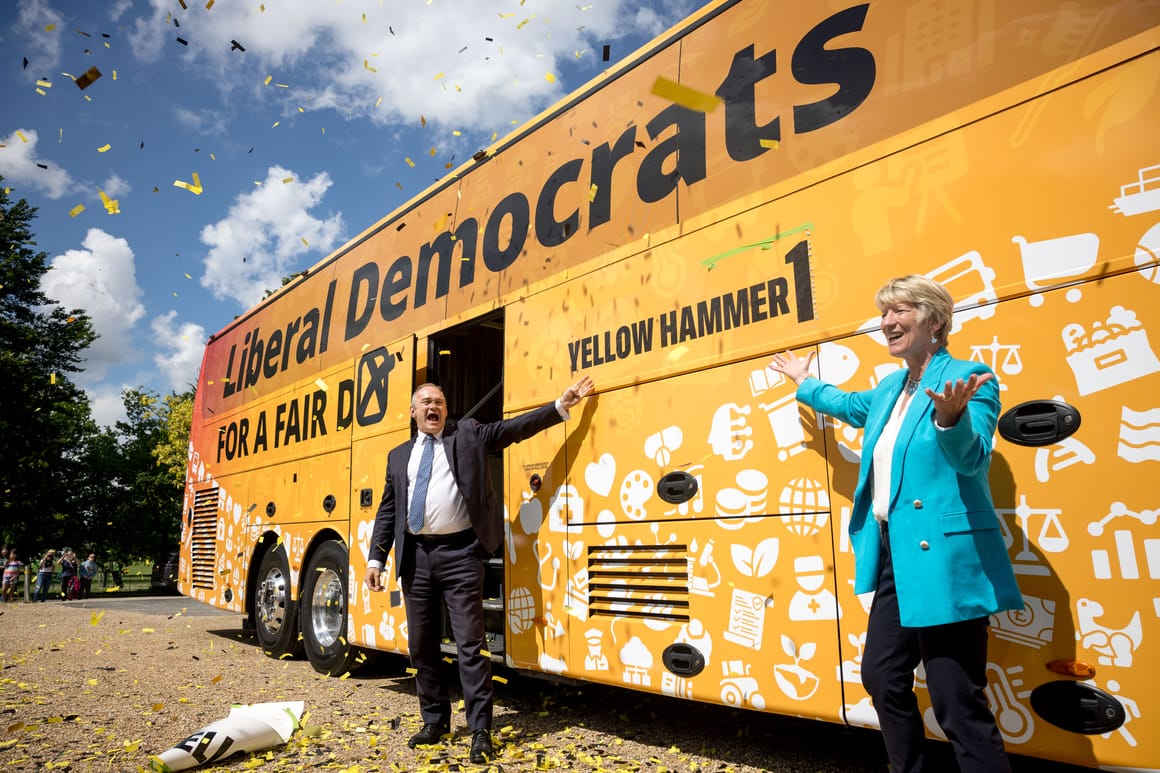Politics
Liberal Democrats Emphasize Climate Focus to Gain Voter Support

The Liberal Democrats (Lib Dems) are intensifying their focus on climate issues as they aim to consolidate support among voters in the United Kingdom. Following a record acquisition of 72 seats during the 2024 general election, the party believes that a strong environmental platform will resonate with an electorate increasingly concerned about climate change.
Pippa Heylings, a Member of Parliament for South Cambridgeshire and the party’s spokesperson on energy and climate, expressed confidence in this strategy. “People are now voting for us because they see us as a pro-environmental party and movement,” she noted, emphasizing the party’s commitment to green policies. According to Heylings, the Lib Dems see an opportunity to fill a gap in political representation as other parties shy away from robust climate commitments.
Targeting Conservative Voters
The Lib Dems are particularly focused on attracting disillusioned voters from the Conservative Party, especially in areas previously dominated by them, known as the Blue Wall. Last year, the party made significant gains in these constituencies, regaining 18 seats in the southwest of England, a historical stronghold. Heylings claimed that the Conservative Party’s retreat from its commitment to achieving net zero emissions by 2050 has created “real discontent” among liberal-minded voters.
The current Conservative leadership, under Kemi Badenoch, has faced criticism for its reduction of environmental targets. Shadow Tory Energy Minister Andrew Bowie referred to climate targets as “arbitrary,” raising concerns about their economic implications. In contrast, the Lib Dems are advocating for an ambitious net zero goal as early as 2045, betting that voters will support a more proactive environmental stance.
Polling data from YouGov indicates that if elections were held today, the Lib Dems could gain an additional nine seats, reinforcing their position as a significant third party in British politics. Heylings remarked, “We’re actually the largest third party in a century. The Conservatives are in a tailspin.”
Balancing Environmental Goals with Economic Concerns
While the Lib Dems are committed to environmental issues, they also face the challenge of addressing voters’ immediate economic concerns. The party acknowledges that voters have “clear limits” on supporting climate policies, particularly if these lead to higher bills or taxes. This awareness comes as the Labour government grapples with rising energy costs, having previously promised to reduce bills by up to £300 annually.
In an effort to address economic anxieties, Lib Dem leader Ed Davey recently proposed breaking the link between gas prices and electricity costs. He believes this change would lower bills and encourage a transition to climate-friendly alternatives, such as heat pumps. “People aren’t seeing the benefit of cheap renewable power,” Davey stated, highlighting the need for practical solutions that align with green initiatives.
The Lib Dems are also looking to shift clean energy generation away from outdated subsidy agreements to more favorable terms, which they claim could reduce household bills by £200 a year. In a recent speech, Davey positioned the party as a defender of public interests against net-zero skeptics, asserting that their policies serve the British populace rather than external interests.
Despite the positive messaging around their climate agenda, the party faces accusations of hypocrisy from political opponents. Labour MP Josh MacAlister pointed out instances where Lib Dem representatives have opposed clean energy projects locally, raising doubts about their commitment to environmental progress.
In response, Heylings argued that the party’s commitment to both environmental standards and housing development can coexist, dismissing the “not-in-my-back-yard” sentiment often associated with local opposition to renewable energy projects. She stated, “You can do both house-building and nature recovery. You can do high environmental standards and they can still be affordable.”
As the Lib Dems work to solidify their green credentials, they have until the next election in 2029 to demonstrate to voters that they are genuinely committed to environmental issues, moving beyond perceptions of being a “dustbin” vote, as Labour veteran Diane Abbott once described. The path ahead is fraught with challenges, but the party’s climate-focused strategy could be key to reshaping its political fortunes in the coming years.
-

 Top Stories3 months ago
Top Stories3 months agoTributes Surge for 9-Year-Old Leon Briody After Cancer Battle
-

 Entertainment4 months ago
Entertainment4 months agoAimee Osbourne Joins Family for Emotional Tribute to Ozzy
-

 Politics4 months ago
Politics4 months agoDanny Healy-Rae Considers Complaint After Altercation with Garda
-

 Top Stories4 months ago
Top Stories4 months agoIreland Enjoys Summer Heat as Hurricane Erin Approaches Atlantic
-

 World5 months ago
World5 months agoHawaii Commemorates 80 Years Since Hiroshima Bombing with Ceremony
-

 Top Stories3 months ago
Top Stories3 months agoNewcastle West Woman Patricia Foley Found Safe After Urgent Search
-

 Top Stories5 months ago
Top Stories5 months agoFianna Fáil TDs Urgently Consider Maire Geoghegan-Quinn for Presidency
-

 World5 months ago
World5 months agoCouple Convicted of Murdering Two-Year-Old Grandson in Wales
-

 World5 months ago
World5 months agoGaza Aid Distribution Tragedy: 20 Killed Amid Ongoing Violence
-

 World5 months ago
World5 months agoAristocrat Constance Marten and Partner Convicted of Infant Murder
-

 Top Stories4 months ago
Top Stories4 months agoClimbing Errigal: A Must-Do Summer Adventure in Donegal
-

 Top Stories4 months ago
Top Stories4 months agoHike Donegal’s Errigal Mountain NOW for Unforgettable Summer Views









